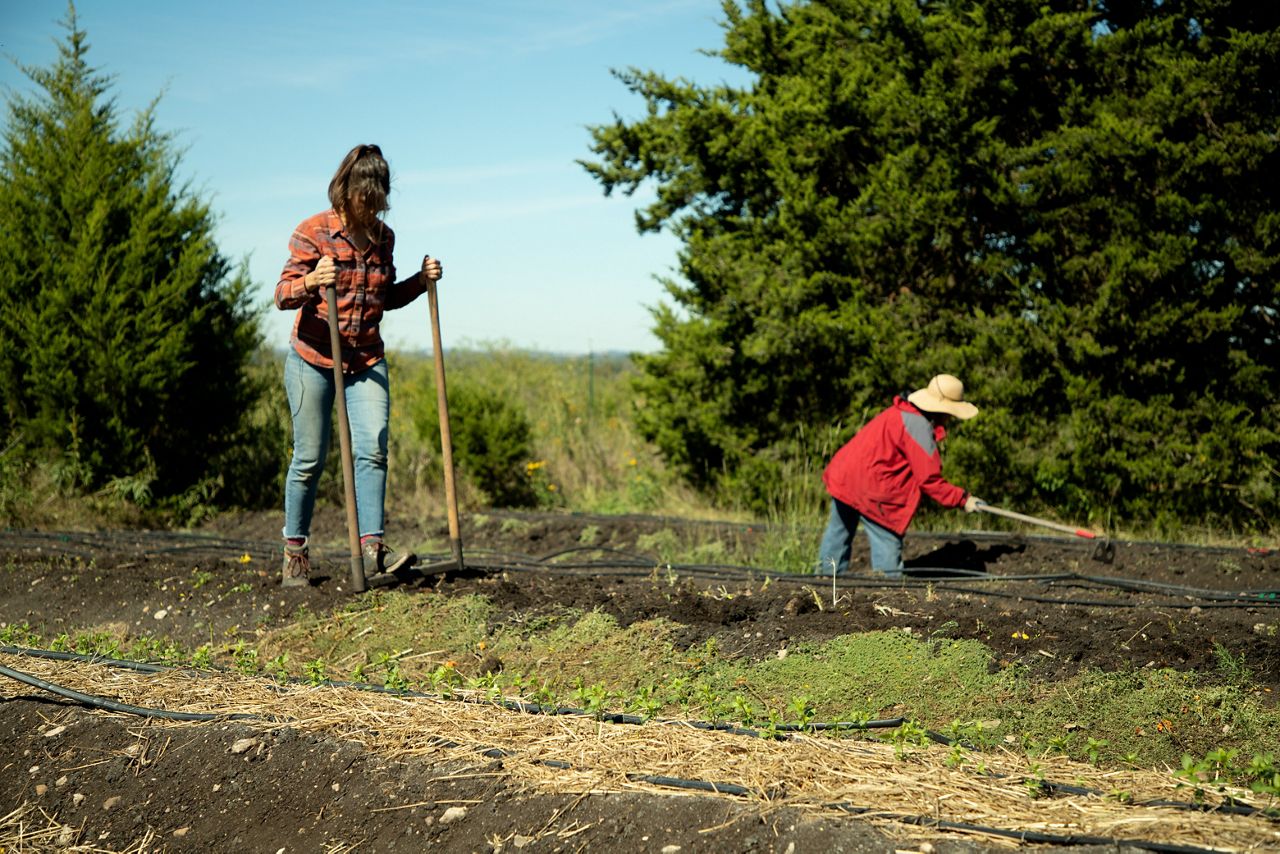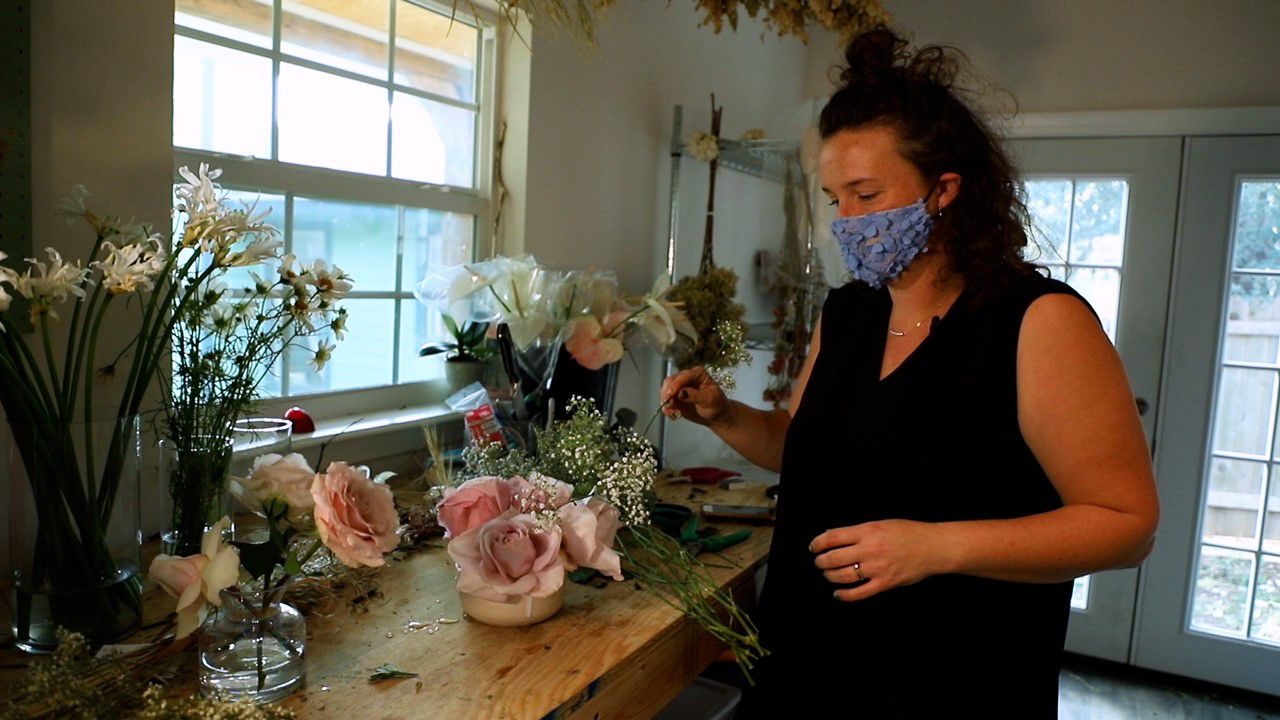TEXAS – For the last eight months, people have been searching for normalcy and comfort to guide them through unprecedented times – things that allow them to connect while still isolating. It’s something that has brought record profits to video game companies and the resurgence of drive-in movie theaters.
That search for comfort may also be what’s keeping the floral industry alive despite months of postponements and canceled events.
What You Need To Know
- Flower industry took a hit with event postponements in the spring
- Many were able to sell unused flowers directly to consumers
- Others are finding that events are rescheduling instead of outright canceling
- Studies point to a connection between presence of flowers and happiness
Sam Eberhardt owns Cassiopeia Farm, a small flower farm located behind her home in Austin, with her husband Dan Poole. The two spent the spring and summer watching florists cancel flower orders as weddings and events were postponed due to pandemic social distancing orders.
“It seems like initially events – they didn’t just halt completely. People were still kind of holding out, holding hope that we would be able to hold events, but then eventually people realized, ‘okay,’ that we couldn’t have events,” says Eberhardt.
But despite those cancellations, they say they didn’t face massive losses because orders kept coming in, just from other places.
“COVID has sort of been a mixed bag for us. A lot of our flowers eventually end up in the hands of florists – maybe they go to a wholesale house first and then they end up at a florist – but florists have had a pretty large drop in business because of COVID. They aren’t doing weddings and events anymore. Our flowers aren’t going to them, instead they’ve been going direct to consumer and some to wholesale, but direct to the consumer through the farmers' market has been our main sales outlet this year,” says Poole.

“I think people were really enjoying getting out to the markets, it was a safe outdoorsy thing to do during COVID. I heard a lot of people mention how it was important to them to support local farmers and ranchers, just keeping the money locally in trying to support the small businesses. And then directly I heard a lot of praise about the emotional and personal effect that bringing the flowers into people’s homes were having on them. You know, bringing in a little spot of joy – the colors, the vibrancy, the scent of the flowers – it just helped people feel connected to the outdoors in a way that I think they were longing for,” says Eberhardt.
But even the news isn’t all bad for florists like Laura Yap, the owner of Mountain Laurel Floral in Austin. Yap’s business is only two years old and she says she was getting into the swing of having a fully booked spring schedule.
“Postponed: I had no cancellations – no cancellations so far,” she says.
Every single wedding on her calendar has rescheduled, allowing her to fill in dates this fall and into 2021 and 2022. She usually doesn’t schedule lots of events in the summer, saying the flowers will die in the Texas heat, but that time allowed her to pivot to focus on rescheduling and preparing for socially distanced weddings in the fall.

Her first wedding back was in August and she says even though many weddings have scaled down the number of people in attendance, they haven’t necessarily reduced their flower orders to match.
“I had people who booked me when everything started and they could have tried to reduce things out of stress because they were – they had to reduce to 50%... Just hearing their passion, the florals were one of the most important things,” Yap says.
The Science of Flowers and Joy
While it may seem like a fluke that these two businesses managed to find a way to stay relevant during a global pandemic, their experiences weren’t necessarily unique.
“Most of the business has changed, but they have continued to stay as relevant or even more relevant to the consumer than before,” explains Texas State Florists’ Association Executive Director Dianna Nordman, “Because with the pandemic shutdown, I think people are trying to show how they miss others in their family and how they miss their friends. And flowers have always been that gift or that item that shares feeling and shares sentiment. So I think people have moved to the flower segment a little more than gifts at this time which has helped our floral industry stay relevant and stay at a good level of business because of that.”
While her organization has not conducted a formal survey of members, Nordman says she’s heard anecdotes from many florists and small flower businesses saying they’re getting business selling flowers directly to consumers. She does stress, though, that this was not the case for every flower business; there are some whose business primarily came from events that are still hurting.
“It is my belief from listening to our members that the consumer is understanding that power of flowers in their life and how they can share the sentiment of their love and happiness,” says Nordam.
Multiple studies have been conducted over the years pointing to the connection between flowers and happiness.
In 2005, Rutgers psychologists, in cooperation with the Society of American Florists, looked at how a person’s emotions can be impacted by receiving flowers, finding that flowers have both an immediate and long-term impact on mood and happiness.
“Specifically, study participants reported feeling less depressed, anxious and agitated after receiving flowers, and demonstrated a higher sense of enjoyment and life satisfaction,” read a report on the study.
Additional research was conducted on the topic in 2018 by the University of North Florida. That study looked at how having flowers in the home can help reduce stress.
“I think there is some kind of hope in a living thing that’s beautiful for a moment that perishes and that’s kind of commentary on what we’re doing,” says Yap.
And that beauty is allowing their small businesses to persist, even as other event focused businesses close their doors permanently.
“I don’t really feel that flowers are a necessity, we can technically survive without flowers – I might get some flak for that from florist friends – I think in a sense it was bolstering people’s spirits, so maybe they are a bit of a necessity,” says Eberhardt.



